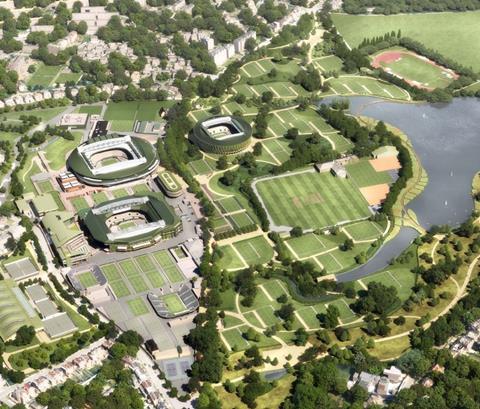Allies & Morrison’s plans to treble the size of grand slam tournament’s grounds finally approved after year-long planning saga

The Greater London Authority has approved Allies & Morrison’s £200m plans to treble the size of the Wimbledon tennis championships’ grounds in the latest twist in a year-long planning saga.
Deputy London mayor Jules Pipe overturned Wandsworth council’s rejection of the landmark scheme this afternoon following an impassioned and sometimes heated four-hour hearing.
It marks a definitive and positive reversal of fortunes for the biggest expansion in the grand slam tournament venue’s history, which has been mired in planning limbo since it was rejected by the borough council in November last year.
The controversial proposals would see the construction of 38 new tennis courts and an 8,000-seat show court on Metropolitan Open Land (MOL) neighbouring the All England Lawn Tennis Club’s (AELTC) main site in Wimbledon.
Wandsworth council, which covers around 10% of the site, voted to refuse the application last autumn due to concerns over the loss of public land despite the remaining 90% of the scheme being approved by Merton council two weeks earlier.

It was then called in by City Hall and a series of amendments were made to the plans aiming to increase public access to the site from the neighbouring Wimbledon Park.
Wandsworth planning officials told the hearing this afternoon that they stood by their previous position and described Allies & Morrison’s amendments as “minor” and falling “short of overcoming” the council’s concerns.
The local authority’s senior planning officer Ben Hayter argued that the proposals would cause “significant harm” to the MOL, adding: “The deputy mayor should be in no doubt that the development represents significant encroachment onto the protected landscape.”
The meeting also heard several representations from objectors including Richard Rees, an architect and campaigner who masterplanned the championship’s 1990s overhaul which included the No 1 Court and Henman Hill.
Rees, who also masterplanned the tennis centre for the 2004 Athens Olympics and was an advisor to both the Beijing Olympics and Rio de Janeiro games, said the pressure on Wimbledon’s existing site from an influx of 8,000 new visitors had been “ignored”.

“It is unlikely that the extra numbers will just hang around in the park but will be drawn to the main site attractions. This would create a potentially dangerous overcrowding situation,” he said.
Rees added: “Wimbledon is a unique grand slam that should be celebrating its sympathetic relationship to the park and its place in the British summer festival tradition and not creating an industrial-scale commercial tennis complex. Size is not everything.”
Representatives from the AELTC and its project team were closely questioned by Pipe about their justification for the scale of the expansion during a meeting which at times appeared tense. AELTC chief executive Sally Bolton’s claim that 39 courts, including the show court, was the “minimum that we could work with” was greeted with laughter from attendees.
She said an additional 18 match courts and 8 practice courts were needed to allow qualification rounds within the grounds of the tournament, the only grand slam which is currently unable to do so.

The new show court would help to relieve scheduling pressure caused by bad weather, while the remaining courts would be reserved for the local community and to provide additional practice space for main draw competitors.
“We’re in a position currently where we have the world’s best players sharing practice courts – we know because they tell us that is not a world-class experience, and certainly not an experience befitting a grand slam of Wimbledon’s standing,” Bolton said.
Audible amusement from objectors was also evident when Jon Roshier, director at planning consultant Rolfe Judd, claimed that illustrations of members of the public who were shown enjoying the expanded grounds in a video presentation of the proposals represented people on “curated tours”. He had been asked to explain the images by Pipe as the grounds would be restricted for the majority of the year.
But the deputy mayor concluded following a two-hour deliberation period that the scheme would provide “very significant” public benefits that would “clearly outweigh” any harm done to public land.

He added in his closing statement that this would be the case whether or not the land was assumed to be held in a statutory trust, a key point of disagreement between Merton and Wandsworth councils, although he said this would now be a “matter for the courts”.
Pipe also said that, while the development would be “inappropriate” on MOL, in practice the land, which has been the site of a golf club, “has been extremely constricted for the past century, principally to fee-paying golfers”.
Earlier, AELTC chair Deborah Jevans told the hearing that the proposals aimed to “ensure that Wimbledon does maintain its status at the pinnacle of the sport – it’s as simple as that.”
Jevans, who lives in Southfields, which is close to the championship grounds, said: “We are falling behind the other grand slams. They have since moved their qualifying onsite and are able to open up their facilities to many more people.
“We want to do that, we’re passionate about that, but equally, as someone who also lives in Southfields, I want to deliver what we can for the community. And we have to do both hand in hand.”
The plans for the site also include seven new maintenance buildings and a pedestrian bridge crossing Wimbledon Park Lake, which would be altered and expanded with a de-culverted channel running through part of the parkland alongside the new tennis courts.



























No comments yet